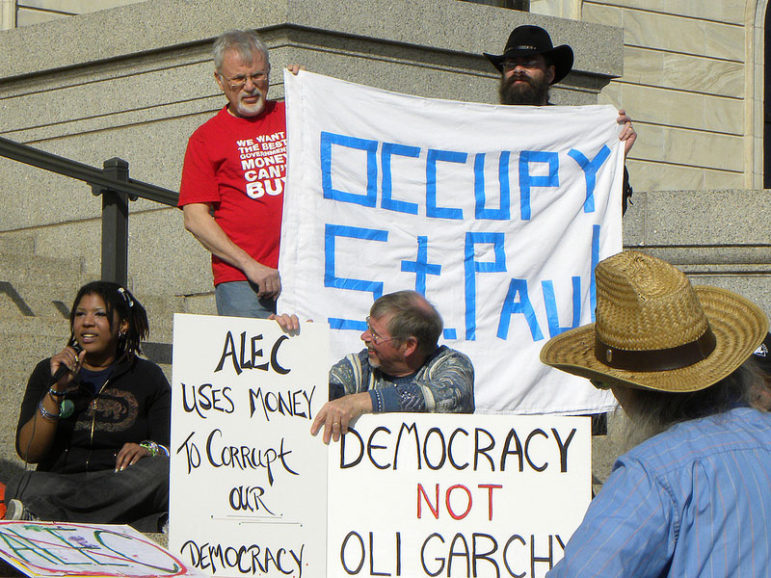
October 6, 2016; PR Watch
In 2012, the Center for Media and Democracy (CMD) and Common Cause (CC) first filed a complaint with the IRS accusing the American Legislative Exchange Council (ALEC) of being “misclassified as a nonprofit organization under Section 501(c)(3) of the Internal Revenue Code because the primary purpose of the organization is to provide a conduit for its corporate members and sponsors to lobby state legislators.” At issue is the line between educating about issues and the support of specific legislative outcomes that is lobbying.
On its website, ALEC describes itself as an organization “dedicated to advancing and promoting the Jeffersonian principles of limited government, free markets and federalism at the state level. ALEC accomplishes this mission by educating elected officials on making sound policy and providing them with a platform for collaboration with other elected officials and business leaders.”
Rather than education, ALEC’s accusers, in the words of the Minnesota Campaign Finance and Public Disclosure Board, see the organization’s primary purpose as “the passage of legislation in the varying states, and…all of its wide-ranging activities are in support of this primary purpose.”
Last week, CMD and CC submitted more than 240 new exhibits illustrating how ALEC has acted as a lobbyist, supporting Exxon’s campaign to block state and federal action to combat global warming. The new filing alleges:
Exxon has used ALEC as a key asset in its multi-billion dollar campaign to sow uncertainty about climate science, undermine international climate treaties and block any legislation that would impose emission reductions. Exxon has also used ALEC to advance its legislative goals concerning cap-and-trade policies, fracking, the Keystone Pipeline, and the Obama administration’s Clean Power Plan.
Sign up for our free newsletters
Subscribe to NPQ's newsletters to have our top stories delivered directly to your inbox.
By signing up, you agree to our privacy policy and terms of use, and to receive messages from NPQ and our partners.
Over 17 years, Exxon has contributed more than $1.7 million to ALEC. In addition to receiving a tax deduction, Exxon has allegedly been able to influence ALEC’s efforts in alignment with its corporate strategy. According to the complaint, Exxon has placed corporate representatives on ALEC’s “board and on energy-related issue task forces, where corporations introduce ‘model’ legislation and hold de facto veto power over what bills are subsequently promoted by ALEC. Exxon’s collusion with ALEC has helped introduce scores of coordinated bills in state houses across the country, including resolutions in 22 states to oppose EPA’s plan to regulate greenhouse gases.”
The extent of ALEC’s support of Exxon’s position is illustrated by ALEC’s position that there is no threat to public health or welfare from climate change or increased levels of greenhouse gases. Instead, ALEC’s reports and model legislation claim that global warming has been a benefit: “During the warming of the past 100 years Global GDP has increased 18-fold, average life span has doubled, and per capita food supplies increased.”
The new filing also claims that ALEC’s lobbying can be detected in how actively they track specific legislation for the benefit of their members. Eric Havian, a partner at Constantine Cannon serving as counsel in this filing, described how this represents a misuse of ALEC’s charitable status:
ALEC acts as a nonprofit lobbying concierge, with Exxon its eager patron. It is corrupt to use the tax laws as a cover for corporate lobbying, but it’s even worse in this case. Exxon uses ALEC’s charitable status to fuel its disinformation campaign on climate change, so taxpayers are literally paying Exxon to lie to them.
That this complaint has remained unresolved for more than four years suggests just how difficult the issue is for the IRS. Exactly when does providing information become lobbying? Is educating legislators different than educating voters? If the information being used is “wrong,” does it matter? How far away from affecting governmental action should tax deductibility be kept? As Ann Pearson, general counsel at CMD, says, “If the laws governing nonprofits are to mean anything, the IRS needs to take action to enforce them.”—Martin Levine













